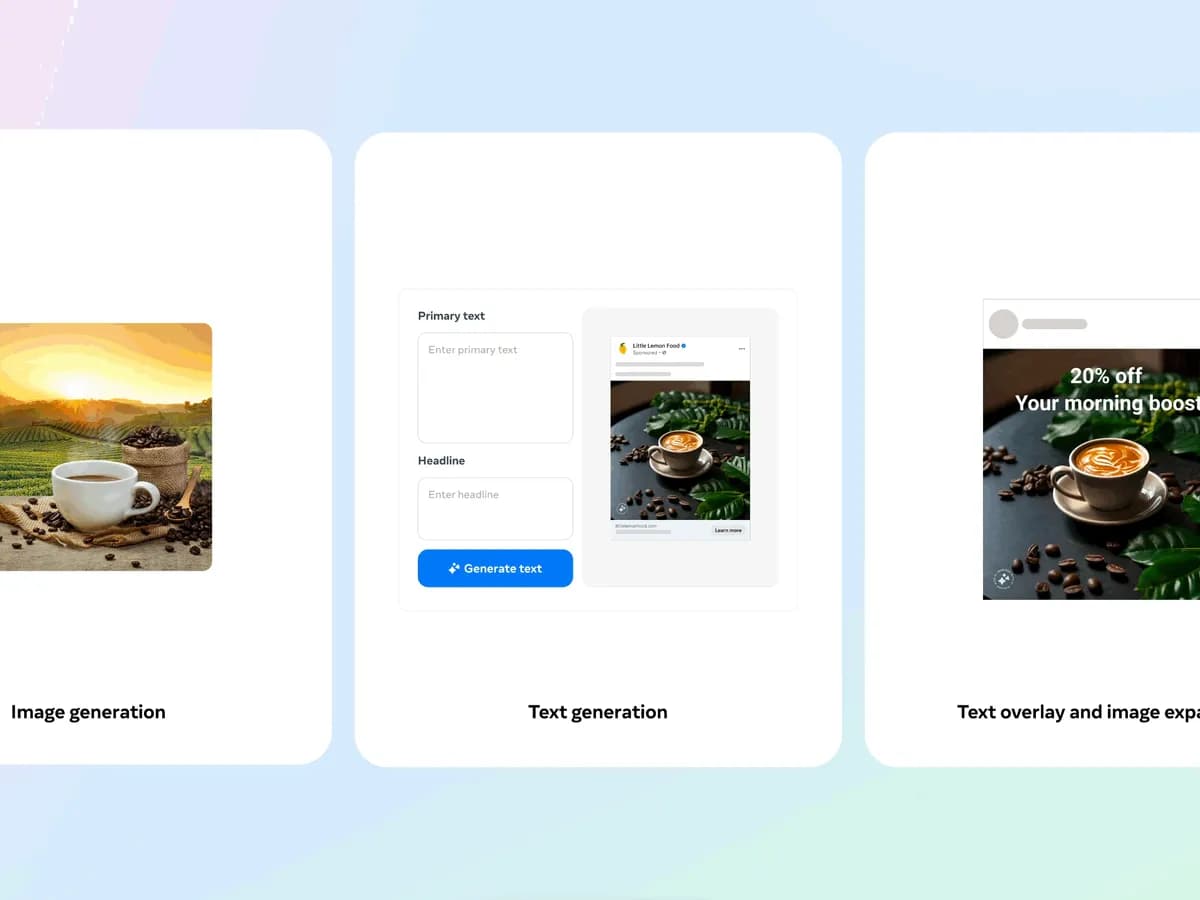Meta's experimental AI photo feature launches beta testing, reshaping how brands approach visual content creation while raising authenticity questions
The New AI Creative Frontier
Instagram's parent company Meta has begun quietly testing an experimental AI photo generation feature within the platform's creative tools, marking a significant shift in how brands and creators approach visual content creation. The feature, discovered by social media analysts this week, allows users to generate photorealistic images using text prompts directly within Instagram's interface.
This development comes as marketers grapple with an increasingly complex landscape where authenticity and efficiency often pull in opposite directions. The timing isn't coincidental—it's happening precisely as 92% of marketers report that AI is transforming engagement, according to Smartly's recent Digital Trends Report.
How the Feature Works
The experimental tool, spotted in beta testing with select creators and brands, integrates seamlessly into Instagram's existing photo editor. Users input descriptive text prompts (think "professional product shot of sneakers in urban setting" or "lifestyle photo of friends enjoying coffee"), and the AI generates multiple options that can be refined with additional prompts.
What makes this different from existing AI image generators is its deep integration with Instagram's native tools. The generated images maintain the platform's aesthetic requirements—optimal aspect ratios, lighting that matches Instagram's preferred visual style, and built-in hashtag suggestions based on the generated content.
Sarah Chen, a digital marketing strategist who gained early access to the beta, tells Social Media Marketing News: "It's surprisingly sophisticated. The AI understands Instagram's visual language in ways that external tools don't. The generated content feels native to the platform rather than imported."
The Creator Economy Impact
For creators and influencers, this could be game-changing. The pressure to maintain constant visual output while standing out in crowded feeds has created what industry experts call "content burnout syndrome"—a phenomenon where creators struggle to keep up with platform demands for fresh, high-quality visuals.
Early testing shows creators using the tool for:
- Behind-the-scenes content when actual photography isn't possible
- Product showcase variations without requiring physical samples
- Seasonal content planning when outdoor shooting conditions aren't ideal
Marcus Rodriguez, senior social media strategist at Social Media Marketing News, explains: "Creators spend 15-20 hours weekly on visual content creation. AI-assisted generation could free up significant time for community engagement and strategy—areas where human connection matters most."
Marketing Implications and Concerns
Brand marketers are approaching the technology with measured enthusiasm. While the efficiency gains are obvious, concerns about brand authenticity and consumer trust remain paramount.
The timing of Instagram's move is particularly interesting given recent research showing that AI-generated ads face consumer trust challenges. A November study revealed that purchase intent drops significantly when consumers detect AI-generated advertising content.
"Brands need to be transparent about AI use," says Victoria Sterling, platform trends analyst. "Consumers are becoming more sophisticated at detecting synthetic content. The backlash risk is real."
Early brand adopters report mixed results:
- Fashion brands finding success with lifestyle imagery generation
- Tech companies using it for product mockups and concept visualization
- Service businesses struggling to maintain authentic connection
The Broader Platform Strategy
Meta's rollout appears strategic, coming as platforms compete for creator attention and brand advertising dollars. TikTok recently launched its Creator Commerce Hub with a $50M fund, while YouTube has expanded its AI-powered content creation tools.
This positions Instagram to compete not just on reach, but on creator efficiency—a key differentiator as creators increasingly choose platforms that help them scale their operations.
The feature also aligns with Meta's broader AI integration strategy. Their GEM AI model for ad creation, launched earlier this month, shows the company's commitment to embedding AI throughout the creator and advertiser experience.
Technical Challenges and Limitations
Current beta testing reveals several constraints that marketers should understand:
Quality consistency varies significantly based on prompt specificity and complexity. Simple requests ("outdoor product photo") yield better results than complex scenes requiring multiple elements.
Brand guideline integration remains limited. The AI doesn't yet understand specific brand color palettes, logo placement rules, or style guidelines without extensive prompt engineering.
Intellectual property concerns arise when generating content that resembles existing brand aesthetics or copyrighted imagery.
Looking Ahead: Strategic Considerations
As Instagram prepares for broader rollout, marketers should consider several strategic questions:
Disclosure policies will likely become crucial. Should brands label AI-generated content? Current platform guidelines are silent, but regulatory pressure may force clarity.
Content differentiation will become harder as more brands access similar AI tools. The competitive advantage shifts from "can you create?" to "how creatively can you prompt?"
ROI measurement needs evolution. Traditional metrics like engagement rates may need adjustment when content creation costs drop dramatically.
The Bottom Line
Instagram's AI photo generation represents more than a new feature—it's a fundamental shift in content creation economics. Marketers who approach it strategically, balancing efficiency gains with authenticity concerns, will likely find significant advantages in the evolving social media landscape.
The key insight: AI won't replace human creativity, but it will amplify it. The brands and creators who master this new tool while maintaining genuine connection with their audiences will define the next phase of social media marketing.
What to watch: How other platforms respond, regulatory developments around AI content disclosure, and evolving consumer attitudes toward AI-generated brand content.
Amanda Foster
Digital transformation analyst covering AI's impact on marketing operations and ROI measurement for Social Media Marketing News. With 7 years tracking enterprise technology adoption, she helps brands navigate strategic automation.




